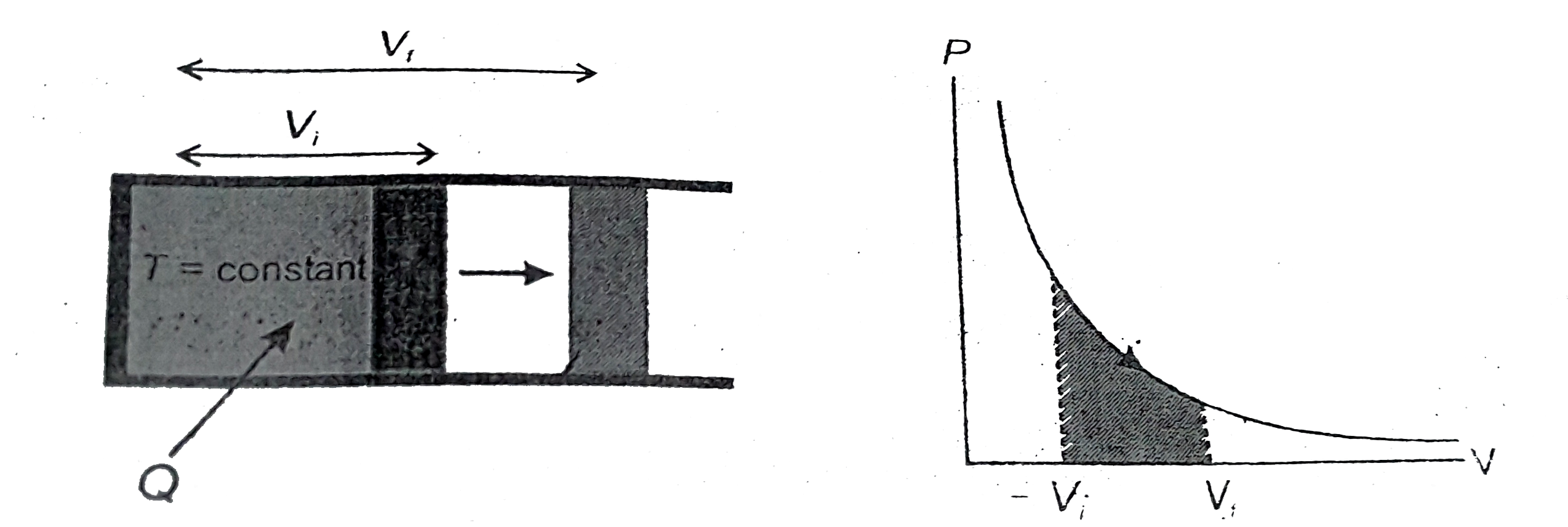A cylinder contains 0.50 mol of an ideal gas at temperature of 310 K. as the gas expands isothermally from an initial volume of 0.31 m3 to a final volume of 0.45m3, find the amount of heat that must be added to the gas in order to maintain a constant temperature.

Since the process is isothermal, the internal energy of an ideal gas does not change, i.e., ΔU=0. The relation ΔU=Q−W gives Q=W, where W is positive (work is done by the system). Now, we know that the gas gains heat from the surrounding (positive Q). as the work done W is given by ∫VfViPdV, we obtain W as
W=∫VfViPdV=∫VfVinRTVdV=nRT∫VfVidVV=nRT In V∣VfVi=nRT In (VfVi)
Substituting n=0.50mol,R=8.31J/(mol K),Vf=0.45m3andVi=0.31m3, we obatain Q=W=480J.
Similar Questions
A cyclinder contains 0.5 mole of an ideal gas at 310K. As the gas expands isothermally from an initial volume 0.31m3 to a final volume of 0.45m3, find the amount of heat that must be added to the gas in order to maintain a constant temperature.
View Solution3 mole of a gas at temperature 400 K expands isothermally from initial volume of 4 litre to final volume of 8 litre. Find the work done by the gas. (R=8.31Jmol−1K−1)
View Solution
Knowledge Check
Calculate the work done (in joules) when 0.2 mole of an ideal gas at 300K expands isothermally and reversible from an initial volume of 2.5 litres to the final volume of 25 litres.
A996B1148C11.48D114.8One mole of an ideal gas expands at a constant temperature of 300 K from an initial volume of 10 litre to a final volume of 20 litre.The work done in expanding the gas is
A750 JouleB1728 JouleC1500 JouleD3456 JouleCalculate the work done (in joules) when 0.2 mole of an ideal gas at 300K expands isothermally and reversible from an initial volume of 2.5 litres to the final volume of 25 litres.
A996B1148C11.48D897
The pressure of a gas is doubled keeping its temperature constant. Find the ratio of the final volume of the gas to its initial volume.
View SolutionThe pressure of a gas is doubled keeping its temperature constant. Find the ratio of the final volume of the gas to its initial volume.
View SolutionOne mole of an ideal gas expands at a constant temperature of 300K from an initial volume of 10 litres to a final volume of 20 liters. The work done in expanding the gas is (R=8.31J/mole−K) (in joules)
View SolutionTwo moles of an ideal gas have an initial kelvin temperature Ti and absolute pressure Pi the gas undergoes a reversible isothermal compression from an initial volume Vi to a final volume 0.5 Vi
The ratio of the molar specific heat capacity at constant pressure to that at constant volume, γ,for diatomic hydrogen gas is 7/5. In an adiabatic compression, the gas, originally at atmospheric pressure, is compressed from an original volume of 0.30m3 to 0.15m3 What is the final pressure of the gas?
View SolutionA gas is compressed at a constant pressure of 50N/m2 from a volume 10m3 to a volume of 4m3. 100J of heat is added to the gas then its internal energy is
View Solution

